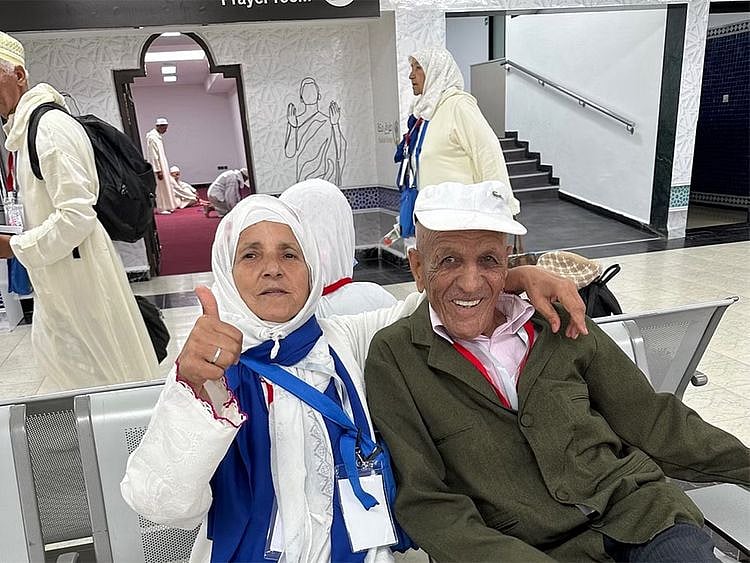Cairo: After dreaming for more than 50 years to perform Hajj pilgrimage in Saudi Arabia, a Moroccan woman, now aged 84, has at last got the chance to fulfil her dream.
The woman, named Zahia Buchta, appeared elated as she and her husband sat at the Mohammad V International Airport in the Moroccan city of Casablanca before boarding a Hajj flight to Saudi Arabia.
“I’m still 25 years old!” she said jokingly before rising up nimbly to prove she is in good health and able to undertake gruelling Hajj rituals.
Also Read
Mecca’s new parking lots ready to welcome 50,000 vehicles for Hajj seasonSaudi Arabia: Facilities to deliver Zamzam to Hajj pilgrims unveiledVisiting Saudi Arabia? How to get a SIM card for Hajj, UmrahOver 40,000 Pakistani pilgrims arrive in Saudi Arabia for Hajj“I’m 84 years old and did not get the chance before to perform Hajj,” she said. “Money was the sole obstacle. But Allah has provided my son with a job, which has enabled him to collect the money needed for the Hajj cost,” she told Saudi news portal Sabq.
Hajj is one of Islam’s five obligatory duties. Muslims, who can physically and financially afford Hajj, have to perform it at least once in a lifetime.
Mecca Route
Hajja Zahia is one of many Moroccans finding their way to Hajj through the “Mecca Route”, a Saudi project offering facilities and ensuring a smooth journey for pilgrims coming from specific countries.
“Everything went well. Procedures for our entry into Saudi Arabia were completed in a few minutes,” she said.
In 2018, the Saudi Interior Ministry relaunched the “Mecca Route” Initiative that gives pilgrims from several countries access to facilities including finalising Hajj-related procedures in their home countries.
The initiative kicked off on a trial basis in 2017.
It is applied this year to pilgrims from seven countries, namely, Malaysia, Indonesia, Pakistan, Morocco, Bangladesh, Turkiye and Cote d’Ivoire.
According to this project, facilities offered to pilgrims include issuance of electronic visas at home, finalising passport procedures as well as tagging and sorting out luggage at the departure airports.
On arrival in Saudi Arabia, those pilgrims head directly to their residences in the holy cities of Mecca and Medina while their luggage are delivered right to their residences.
Sign up for the Daily Briefing
Get the latest news and updates straight to your inbox
Network Links
GN StoreDownload our app
© Al Nisr Publishing LLC 2026. All rights reserved.
